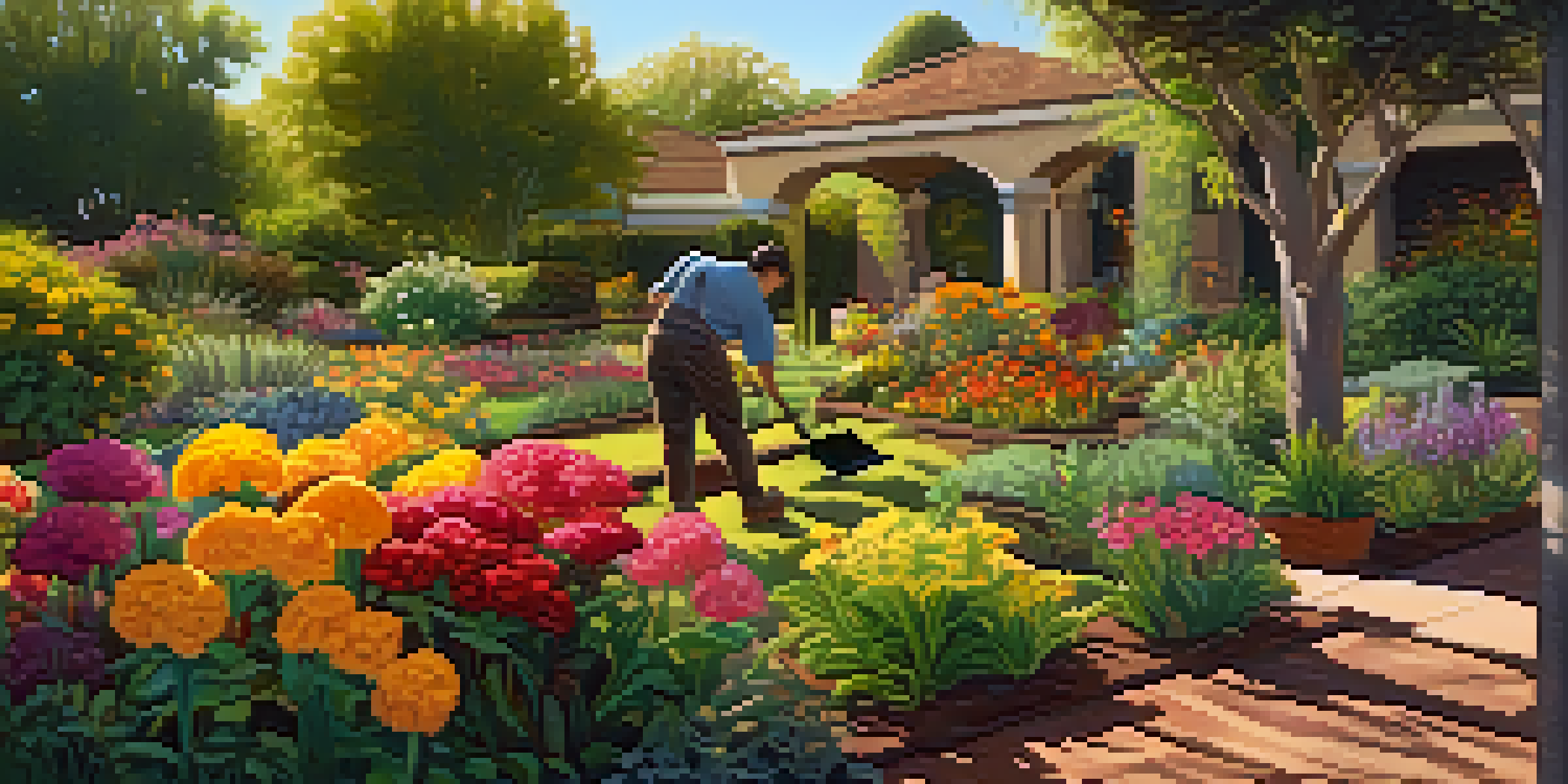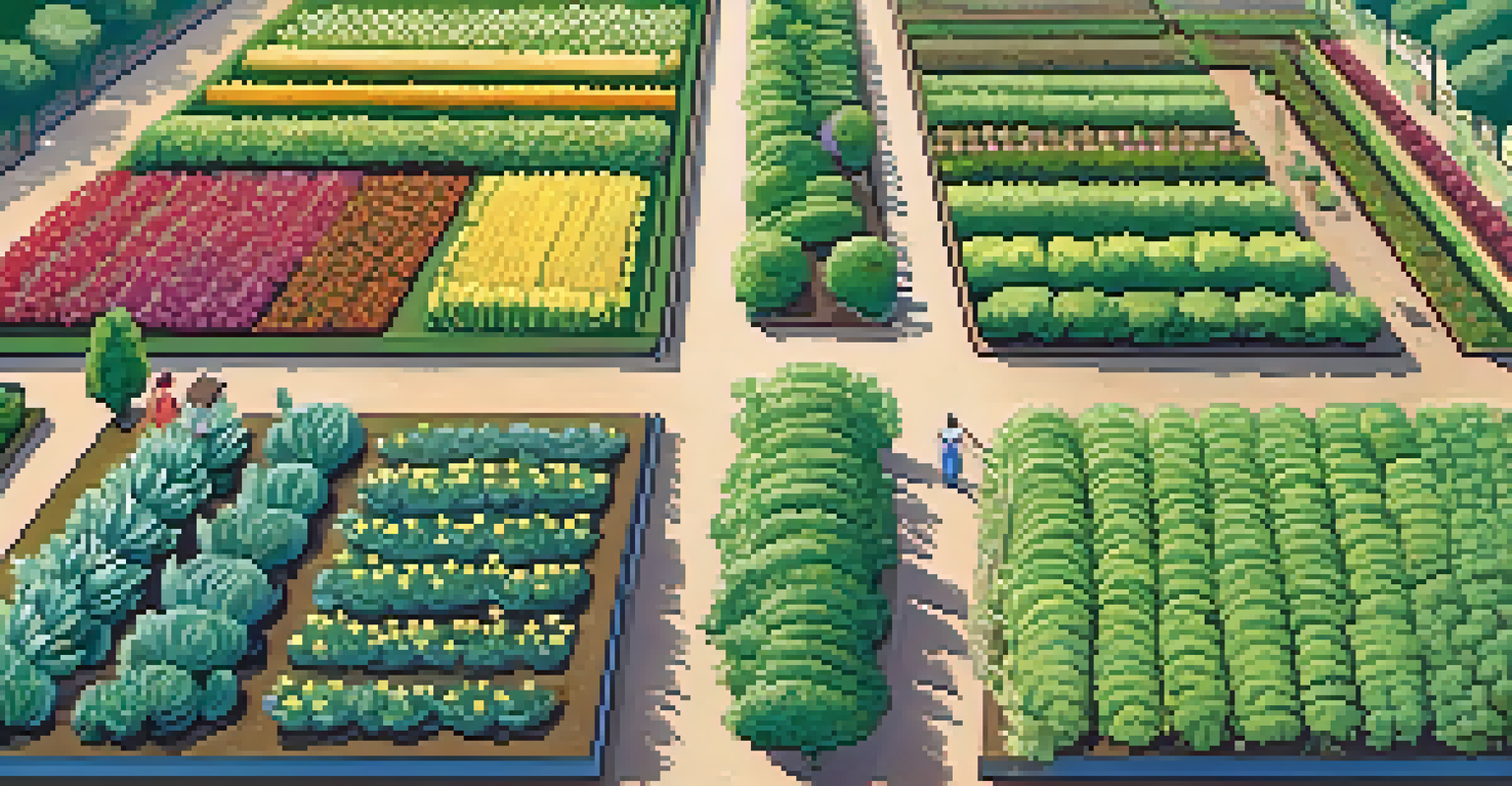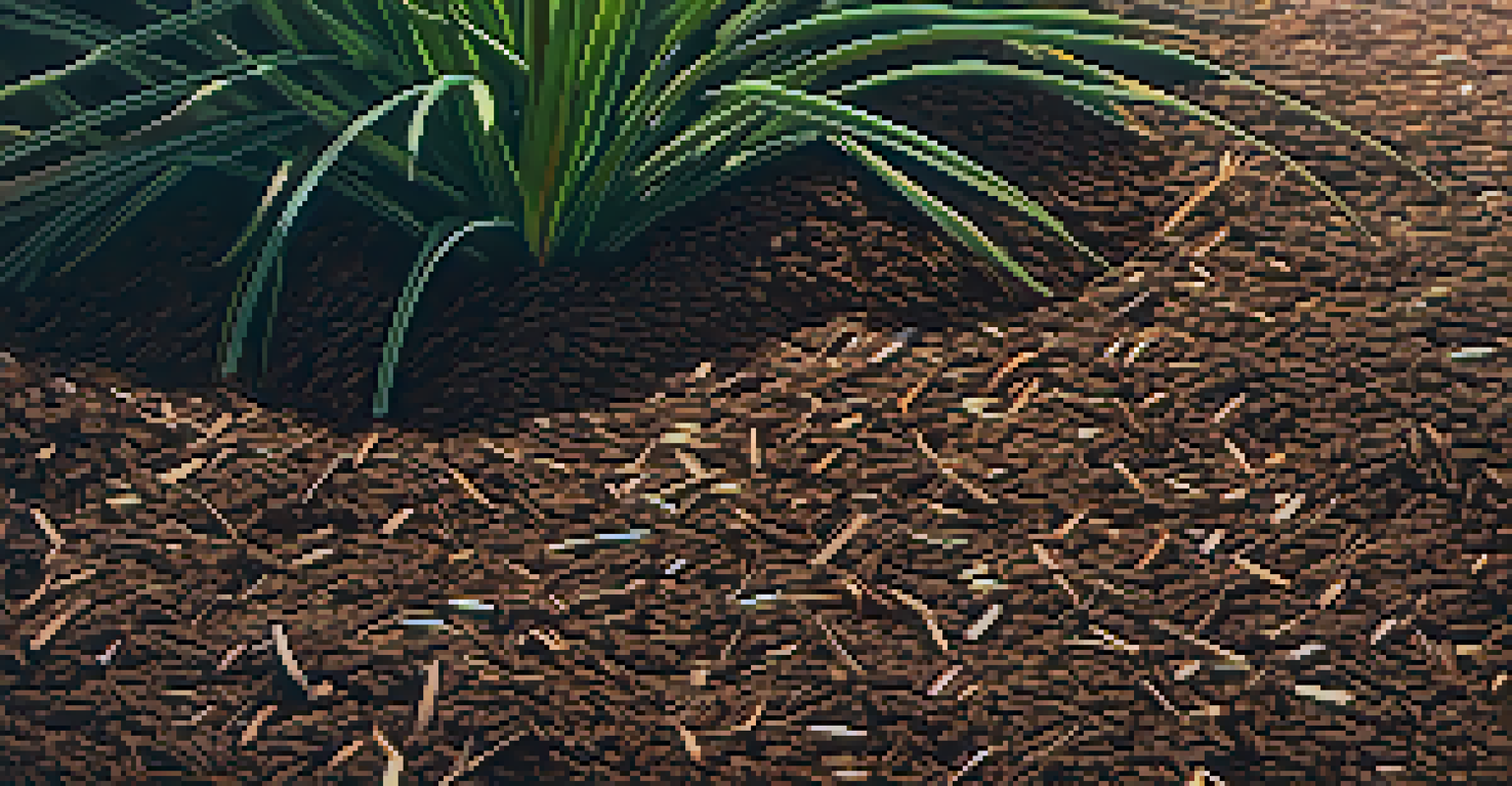Maintaining Soil Health in Phoenix Garden Beds

Understanding Soil Health in Phoenix's Climate
Soil health is crucial for thriving garden beds, especially in Phoenix's arid climate. The region's high temperatures and low rainfall can lead to soil degradation if not managed properly. Healthy soil improves water retention, supports plant growth, and promotes a balanced ecosystem. Understanding the unique challenges of Phoenix soil is the first step toward nurturing it.
Healthy soil is the foundation of healthy plants.
In Phoenix, many gardens face issues like compacted soil, poor nutrient levels, and high salinity. This can hinder plant growth and lead to less fruitful harvests. By recognizing these factors, gardeners can take proactive steps to improve their soil quality. Think of your soil as the backbone of your garden—it needs to be strong to support vibrant plant life.
Additionally, soil health is not just about nutrients; it’s about the living organisms within it. Beneficial microbes and earthworms contribute to soil vitality by breaking down organic matter and aerating the soil. By fostering a healthy soil ecosystem, gardeners can ensure their plants receive the nutrients they need to thrive in Phoenix's challenging environment.
Choosing the Right Soil Amendments
Selecting the right soil amendments is essential for enhancing soil health. Common options for Phoenix gardens include compost, aged manure, and organic fertilizers. These amendments enrich the soil with nutrients and improve its structure. Think of them as food for your soil, helping it to become more fertile and productive.

Compost, in particular, is a powerhouse. It not only provides nutrients but also enhances soil structure, allowing for better water retention and aeration. A simple way to make compost is by collecting kitchen scraps and garden waste, turning them into a rich organic matter that benefits your garden. This not only reduces waste but also nourishes your plants sustainably.
Soil Health is Essential in Phoenix
Healthy soil improves water retention and supports plant growth, making it crucial for successful gardening in Phoenix's arid climate.
When adding amendments, it’s crucial to test your soil first. A soil test can reveal nutrient deficiencies or imbalances, guiding you on what amendments are needed. This tailored approach ensures that you are not over-fertilizing, which can harm plants and pollute local water sources. Remember, healthy soil is a balance of nutrients, and knowing what your soil needs is key.
Implementing Crop Rotation for Soil Renewal
Crop rotation is a time-tested strategy that can significantly improve soil health. By alternating the types of plants grown in a specific area, you can prevent nutrient depletion and reduce pest problems. For example, after growing nitrogen-loving legumes, rotating to root vegetables can help balance soil nutrients. This method keeps your garden lively and productive.
Nature does not hurry, yet everything is accomplished.
In Phoenix, where conditions can be harsh, crop rotation not only improves soil health but also benefits the ecosystem. Different plants have varying root structures, which can help aerate the soil and reduce compaction. It’s like giving your soil a break while keeping the garden productive, as various plants can thrive at different times.
Additionally, crop rotation can help in managing soil-borne diseases. By changing crops regularly, you disrupt the lifecycle of pests and pathogens. This leads to healthier plants and less need for chemical interventions, supporting a more sustainable gardening approach. So, plan your planting schedule wisely for a thriving garden.
Mulching to Conserve Moisture and Improve Soil
Mulching is a simple yet effective technique to enhance soil health in Phoenix gardens. Applying a layer of organic material, like straw or wood chips, helps retain soil moisture and reduce temperature fluctuations. This is especially beneficial in the hot Phoenix climate, where water conservation is crucial for plant survival. Think of mulch as a protective blanket for your soil.
Beyond moisture retention, mulch breaks down over time, adding organic matter to the soil. This improves soil structure and increases nutrient availability for your plants. Plus, it helps suppress weeds, reducing competition for resources. A well-mulched garden is not just easier to maintain; it also promotes a healthier growing environment.
Use Organic Amendments for Soil
Incorporating compost and organic fertilizers enriches the soil with nutrients and improves its structure, leading to a more productive garden.
When choosing mulch, opt for organic materials that will decompose and enrich the soil. Avoid inorganic options like plastic, which can harm the soil ecosystem. By mulching regularly, you create a sustainable cycle that benefits your garden year after year, making it a worthwhile practice for any Phoenix gardener.
Water Management Strategies for Healthy Soil
Effective water management is critical for maintaining soil health, particularly in a desert environment like Phoenix. Overwatering can lead to soil erosion and nutrient leaching, while underwatering can cause stress to plants. Implementing a drip irrigation system can help deliver water directly to the roots, minimizing evaporation and conserving water. This smart approach supports both plant health and soil integrity.
Additionally, consider using rain barrels to collect and store rainwater for your garden. This not only saves on water costs but also provides a natural source of moisture for your plants. Rainwater is typically free of chemicals found in tap water, making it an excellent choice for nurturing healthy soil. Every drop counts, especially in a dry climate!
Monitoring soil moisture levels is also essential. Investing in a moisture meter can help you determine when to water, ensuring your plants get just the right amount. This attentiveness fosters a healthier soil environment, ultimately leading to a more vibrant garden. Remember, healthy soil begins with mindful watering practices.
Encouraging Beneficial Microorganisms in Soil
Beneficial microorganisms play a vital role in maintaining soil health. These tiny organisms, including bacteria and fungi, help decompose organic matter and release nutrients for plants. In a Phoenix garden, encouraging these microorganisms can lead to more resilient plants and improved soil quality. Think of them as nature's little helpers working tirelessly beneath the surface.
To promote these beneficial organisms, focus on adding organic matter to your soil. Compost, leaf litter, and well-rotted manure are excellent options that provide food for these organisms. Creating a diverse soil ecosystem not only enhances nutrient availability but also improves soil structure and moisture retention. It’s a win-win situation for your garden!
Regular Soil Testing is Key
Conducting regular soil tests allows gardeners to understand nutrient levels and pH, enabling tailored amendments for optimal soil health.
Moreover, reducing chemical fertilizers and pesticides can also support the health of these microorganisms. Chemical inputs can disrupt the balance of the soil ecosystem, harming beneficial species. By opting for organic practices, you create a thriving environment for these vital allies, ultimately leading to a more sustainable and productive garden.
Regular Soil Testing for Optimal Health
Regular soil testing is a key practice for maintaining optimal soil health. It helps you understand the nutrient composition and pH levels of your soil, guiding your gardening decisions. In Phoenix, where soil conditions can vary greatly, testing allows you to tailor your amendments and practices to meet your garden's specific needs. Think of it as a routine check-up for your garden's health.
Many local extension services offer soil testing kits that are easy to use. Collecting samples from different areas of your garden can provide a comprehensive view of your soil's health. Once you receive your results, you can make informed decisions about what amendments to apply or if any adjustments are needed in your gardening practices.

Additionally, regular testing helps track changes over time, allowing you to see the impact of your soil management efforts. This proactive approach can prevent issues before they arise, ensuring your garden remains vibrant and productive. By making soil testing a part of your gardening routine, you invest in the long-term health of your garden.